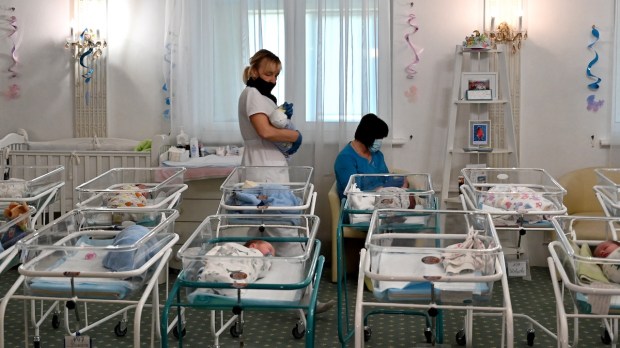Surrogacy – the act in which a woman agrees with a couple to become pregnant and bear a child for them – has been in the news lately. Pope Francis called for a global ban on surrogacy on January 8.
“I deem deplorable the practice of so-called surrogate motherhood, which represents a grave violation of the dignity of the woman and the child, based on the exploitation of situations of the mother’s material needs,” the Pope said in his annual address to the diplomatic corps at the Vatican. “A child is always a gift and never the basis of a commercial contract. Consequently, I express my hope for an effort by the international community to prohibit this practice universally.”
Last fall, the European Parliament’s Committees included the practice of surrogacy in the list of human-trafficking offenses. And the Vatican’s Dicastery for the Doctrine of the Faith is reportedly preparing a document about the practice.
In the United States, Michigan is considering a bill that would allow surrogacy contracts and compensation. Aleteia spoke with Rebecca Mastee, J.D., policy advocate for Michigan Catholic Conference (MCC) about those legislative efforts.
[In photo above, nurses cared for newborn babies at the Venice hotel in Kyiv, Ukraine, in 2020. More than 100 babies born to surrogate mothers were stranded in Ukraine as their foreign parents could not collect them due to border closures imposed during the coronavirus pandemic.]
Recently, the European Parliament’s Committees included the practice of surrogacy in the list of human-trafficking offenses. What does this action mean to you? Is this action going against the tide in Europe? How does it compare to the legal landscape regarding surrogacy in the US?
Rebecca Mastee: That is encouraging news and certainly appears to be in line with their 2015 resolution, which previously condemned the practice of surrogacy. In that document the European Parliament recognized that surrogacy “undermines the human dignity of the woman,” “involves reproductive exploitation,” and should “be prohibited and treated as a matter of urgency in human rights instruments.”
Continued recognition of the exploitative nature of surrogacy, along with the fact that many countries in Europe and throughout the world either ban the practice entirely or ban commercial surrogacy, is further evidence of the serious human rights concerns caused by surrogacy.
The United States and its more permissive view of surrogacy, perhaps spurred on by a celebrity culture that has promoted the practice, is an outlier among developed nations. Our country champions itself as a defender of human rights and would certainly do well to look closer at the human rights violations that result from surrogacy.
In addition to the exploitation of women, a 2018 United Nations Report by the Human Rights Council recognizes that “commercial surrogacy often involves abusive practices” and that it directly challenges human rights norms, noting that some commercial surrogacy practices violate the international prohibition on the sale of children.
The United States and its more permissive view of surrogacy, perhaps spurred on by a celebrity culture that has promoted the practice, is an outlier among developed nations.
What is at issue in Michigan? How might the outcome affect the legal status of surrogacy in other states?
Mastee: “Altruistic” surrogacy – a practice that tends to occur between close friends or family, with the baby being adopted by the intended parents upon birth — is presently legal in Michigan. The adoption process is one safeguard to ensure the baby is being suitably placed within a family.
However, the Michigan Legislature is considering a package of bills that would permit commercial surrogacy, which provides for the use of contracts and compensation and eliminates the adoption process currently required for surrogate births in Michigan, along with the necessary oversight it provides.
There are serious concerns with both altruistic and commercial surrogacy. With Michigan’s proposed expansion of surrogacy contracts and compensation, this aspect is of primary focus. A shift in the law would present a host of additional social, moral, ethical, and legal problems.
At the same time, the Michigan Catholic Conference acknowledges the suffering of husbands and wives who experience infertility. Ethical infertility care could better be promoted and the adoption process could be improved. It is also vitally important to always recognize the inherent dignity of each and every person regardless of the circumstances of that person’s birth.
The legislation being considered in Michigan appears to be more permissive than the surrogacy laws of other states. For example, the proposed Michigan law does not require intended parents to be genetically related to the child or be a resident of the state if the surrogate mother is a Michigan resident. “Surrogacy tourism” would exploit Michigan women, should it become a destination for those from other states and the wealthy from other countries.
Pope Francis recently made comments about surrogacy, and it’s been reported that the Vatican Dicastery for the Doctrine of the Faith might be publishing a document that concerns surrogacy, at least in part. What does all of this mean for your activism, your cause?
Mastee: Bringing up the topic of surrogacy in conversation appears to catch many people off guard, because it is just not something they have thought about much, and this rings true for many Catholics and pro-life individuals as well. In my experience, surrogacy, and related issues of assisted reproductive technologies and in vitro fertilization, are rarely mentioned in local churches. So, while the Pope’s comments may have been surprising to some people, further communication by the Vatican will hopefully clarify for the faithful the Church’s teaching about surrogacy and human dignity.
What makes you feel justified trying to block surrogacy in Michigan, as it seems you are acting out of a religious motivation?
Mastee: Our work is to promote the dignity of all people, which includes addressing the safety and well-being of women and children. MCC advocates on behalf of the Catholic bishops in Michigan. While our guiding principles are informed by Catholic social teaching, they are also rooted in reason, natural law, and science. The Conference’s policy principles therefore champion human dignity and promote strong families, the building blocks for any society, for all people. Our approach is universal and seeks the common good for the state as a whole. As St. John Paul II stated, “the Church proposes, she imposes nothing.”
In addition to legalizing surrogacy contracts and compensation, the proposed Michigan legislation includes significant and concerning changes to the state’s family and parentage laws. Current law finds parentage through birth, genetics, or adoption by a married couple or a single individual. However, as currently written, these bills would allow individuals — with no guidelines for their relationship or even a requirement they share a household — to consent or contract to intentionally create a child.
In other words, essentially any two people could agree that they intend to parent a child through assisted reproduction or a surrogacy contract, regardless of the individuals’ relationships to each other or to the child. The bills would also enshrine posthumous conception into Michigan law – intentionally creating a child after one or more of their parents have died.
Outside of religious objections, what problems are being more and more recognized about surrogacy?
Mastee: While acknowledging an adult’s longing for a child, it is important to point out that surrogacy contracts generally start with an imbalance of power. Financial disparity between the parties is clearly expected when the law requires the intended parent or parents to pay for the surrogate mother’s legal representation. In Michigan, the proposed legislation currently requires payment for her legal representation throughout the duration of the contract, specifically about the terms of the contract and potential legal consequences. However, this likely will not cover legal representation for a contract dispute, leaving the surrogate mother to either pay for her own attorney in a dispute or, more likely, to succumb to the demands of the intended parents if she cannot afford to hire her own attorney.
The dignity of women must be upheld at all times and in all places. Yet, issues of economic injustice that women face are highlighted by financial motivations to become a surrogate: Should a woman have to sell the use of her body to put food on the table, to pay her student loans, or to get out of debt? These scenarios are especially troubling along with emerging evidence that shows health risks to both the surrogate mother and the baby due to more complicated, high-risk pregnancies occurring in surrogate pregnancies compared to non-surrogate pregnancies.
Legalizing surrogacy contracts and compensation also commercializes the practice, resulting in a new surrogacy industry. While the Michigan legislation as introduced provides some parameters for intended parents, surrogates, and contracts, it is silent about the advertising, recruiting, surrogacy brokers, agencies, and attorneys that will inevitably rise to connect intended parents with surrogates for financial gain. Without accountability, a lack of regulation further opens the door to exploitative practices that have occurred in other U.S. states and countries where commercial surrogacy is present.
What has the opposition to your efforts been like, and how have you answered them?
Mastee: Incentivizing surrogacy by allowing compensation will only exacerbate the problems associated with surrogacy, including economic injustices, the safety and well-being of women, the personal health risks and societal health costs associated with higher-risk pregnancies, and, not the least of which is, allowing people to contract for the creation of a human being. Michigan would do well to retain its prohibition on commercial surrogacy.



